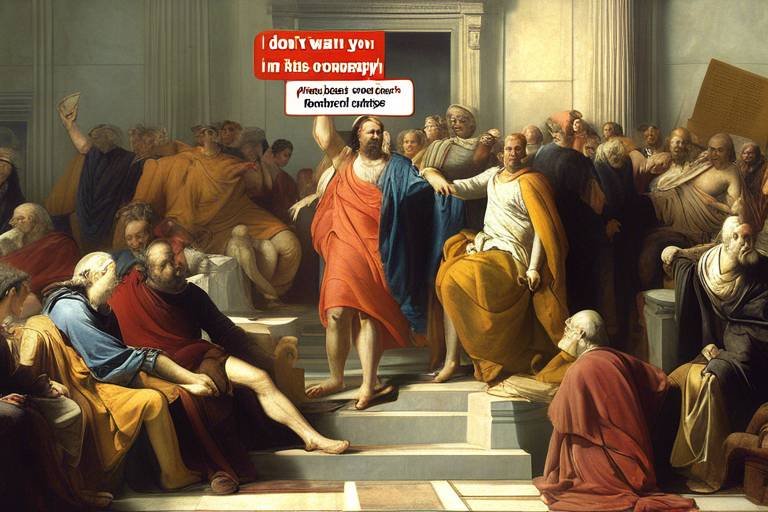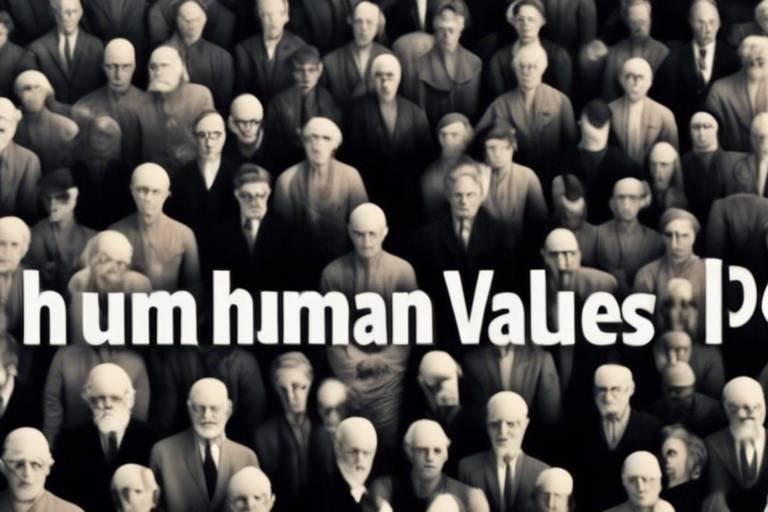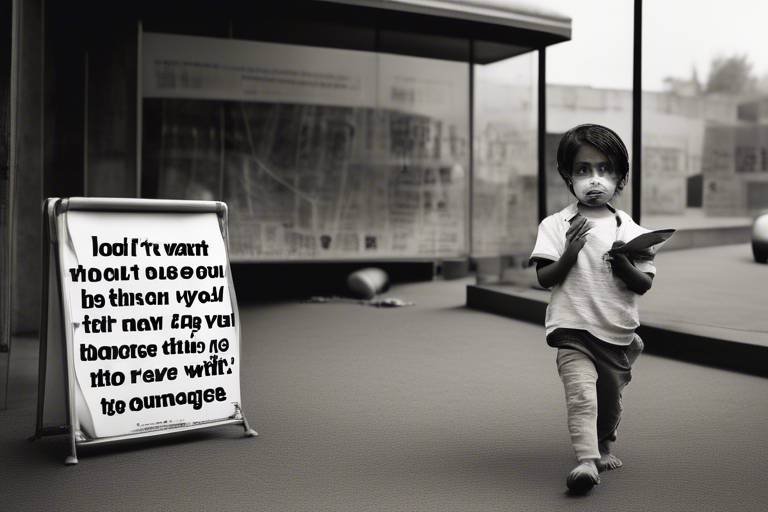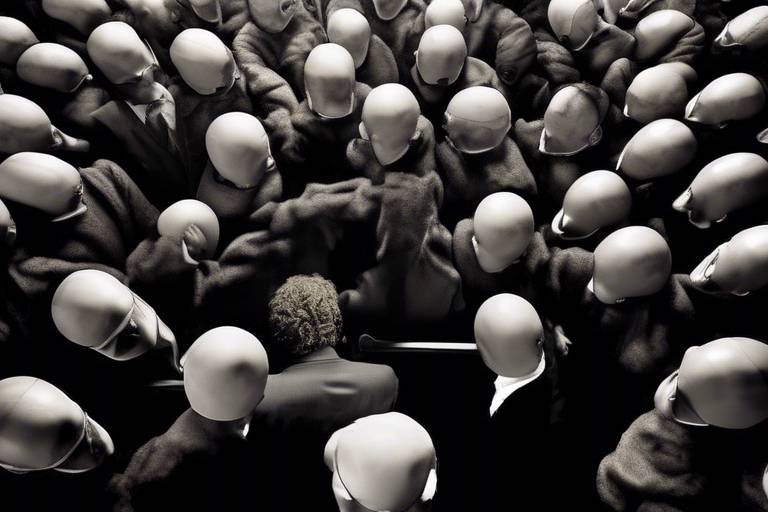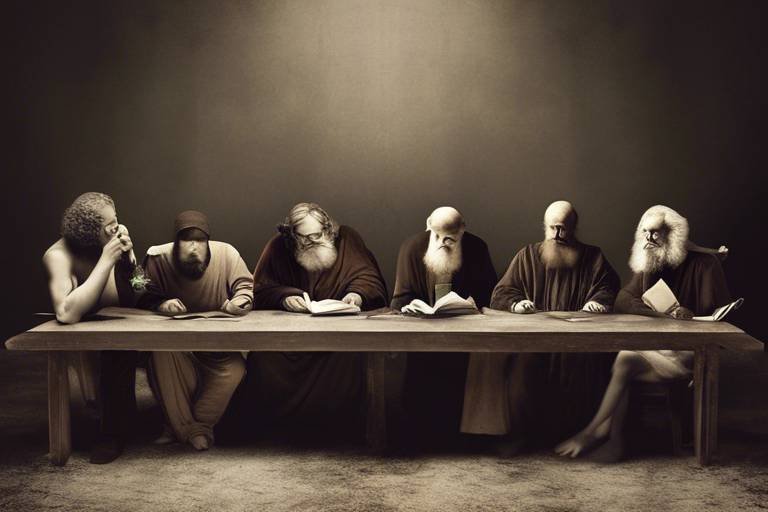Democracy and Philosophy - Links and Discourses
In a world teeming with diverse ideas and beliefs, the intricate relationship between democracy and philosophy serves as a cornerstone for understanding how societies function. At its core, democracy is not merely a system of government; it is a reflection of our shared values and aspirations as a collective. Philosophy, on the other hand, provides the framework through which we can critically analyze and articulate these values. This article embarks on a journey through the historical and contemporary intersections of these two fields, unraveling how philosophical thought shapes democratic ideals and practices.
Imagine democracy as a vast ocean, with philosophical thought acting as the currents that guide its waters. Without these currents, democracy could easily become stagnant, losing its vibrancy and purpose. Throughout history, philosophers have grappled with questions of justice, equality, and individual rights, crafting ideas that have significantly influenced democratic systems. From ancient times to modern-day discussions, the philosophical underpinnings of democracy reveal a rich tapestry woven from the threads of human thought, ethics, and governance.
As we delve deeper into the philosophical foundations of democracy, we will encounter influential thinkers who have left indelible marks on our understanding of governance. Their ideas not only challenge us to think critically about our political structures but also inspire us to envision a more just and equitable society. The interplay between democracy and philosophy is not just an academic exercise; it is a vital dialogue that shapes our realities and aspirations in the contemporary world.
To understand the essence of democracy, we must first explore its philosophical foundations. Thinkers like John Locke, Jean-Jacques Rousseau, and John Stuart Mill have profoundly influenced democratic thought by advocating for principles such as natural rights, social contracts, and liberty. These ideas promote the notion that individuals possess inherent rights that must be respected and protected by the state.
For instance, Locke's theory of natural rights posits that life, liberty, and property are fundamental rights that form the basis of a just society. His ideas laid the groundwork for modern democratic governance, emphasizing the importance of consent and representation. Rousseau, on the other hand, introduced the concept of the social contract, suggesting that legitimate political authority arises from the collective agreement of the governed. Such philosophical frameworks are not just historical artifacts; they continue to resonate in contemporary democratic discussions and practices.
When we look back at ancient philosophers like Plato and Aristotle, we find a rich discourse on democracy that informs our current understanding. Plato, in his work "The Republic," expressed skepticism towards democracy, arguing that it often leads to mob rule and the elevation of unqualified leaders. He believed that a philosopher-king, guided by wisdom and reason, would be best suited to govern. In contrast, Aristotle offered a more balanced view, recognizing the potential of democracy to promote civic virtue and collective well-being, albeit with caution regarding its excesses.
This divergence in ancient thought illustrates the complexity of democratic ideals. It raises critical questions: What is the ideal form of governance? How can we ensure that democracy serves the common good without succumbing to the pitfalls of populism or tyranny? These inquiries remain relevant today, as we navigate the challenges and opportunities presented by modern democratic systems.
Fast forward to contemporary times, and we find ourselves in a vibrant landscape of philosophical debates surrounding democracy. The emergence of theories like deliberative democracy and participatory governance reflects a growing recognition of the importance of citizen engagement in democratic processes. Deliberative democracy emphasizes the role of reasoned discussion and collective decision-making, arguing that such practices enhance democratic legitimacy and effectiveness.
In this context, deliberative democracy encourages citizens to engage in meaningful dialogue, weighing different perspectives before reaching consensus. Think of it as a communal potluck where everyone's voice contributes to a richer, more diverse meal. This approach not only fosters a sense of community but also helps to cultivate a more informed electorate capable of making thoughtful decisions.
Similarly, participatory governance emphasizes the significance of grassroots movements and citizen engagement in shaping policies. It recognizes that democracy is most vibrant when individuals actively participate in the political process, advocating for their rights and interests. This engagement can take many forms, from community organizing to digital activism, showcasing the diverse ways individuals can influence democratic outcomes.
The influence of philosophy extends beyond theoretical discussions; it permeates public debate and policy-making. Philosophical discourse helps frame the ethical considerations surrounding democracy, prompting us to reflect on our responsibilities as citizens and leaders. Questions arise: What are the moral obligations of those in power? How can we ensure that democratic processes are fair and just for all? These inquiries are critical in shaping a democratic culture that values ethical governance and accountability.
Despite its ideals, democracy faces numerous challenges today, many of which have philosophical implications. Issues such as populism, misinformation, and the tension between individual liberties and the collective good pose significant hurdles to democratic governance.
The rise of populist movements raises profound questions about the nature of democracy. What happens when the voices of the many drown out the voices of the few? Populism often thrives on simplistic narratives that appeal to emotions rather than reasoned discourse, challenging the very principles that underpin democratic ideals. It forces us to reconsider the balance between popular will and the protection of minority rights, a tension that philosophers have grappled with for centuries.
Furthermore, the ethical dilemmas inherent in democratic governance cannot be overlooked. The balance between majority rule and minority rights is a delicate one, requiring constant vigilance and reflection. In a democracy, every citizen has a role to play, not just in casting votes but in upholding the moral fabric of society. This responsibility demands active engagement and a commitment to the greater good, reminding us that democracy is not just a system of government but a way of life.
- What is the relationship between democracy and philosophy?
Democracy and philosophy are interconnected, with philosophical thought providing the framework for understanding and critiquing democratic ideals and practices.
- Who are some key philosophers that influenced democracy?
Influential thinkers include John Locke, Jean-Jacques Rousseau, and John Stuart Mill, each contributing essential ideas about rights, governance, and individual freedoms.
- What are the challenges facing democracy today?
Challenges include populism, misinformation, and ethical dilemmas regarding majority rule and minority rights, all of which require careful philosophical consideration.

The Philosophical Foundations of Democracy
At its core, democracy is not just a system of governance; it is a reflection of philosophical ideals that have evolved over centuries. The roots of democratic thought can be traced back to ancient philosophers who grappled with the concepts of equality, justice, and individual rights. These foundational ideas have paved the way for modern democratic practices, shaping the way we perceive our roles as citizens and the responsibilities of our leaders.
One of the most influential thinkers in this realm is John Locke, whose theories on natural rights laid the groundwork for modern democracy. Locke argued that individuals possess inherent rights to life, liberty, and property. This notion of natural rights became a cornerstone of democratic philosophy, asserting that governments are formed to protect these rights, and when they fail to do so, citizens have the right to revolt. His ideas directly influenced the framers of the United States Constitution, embedding the principle of governance by consent into the very fabric of democracy.
Furthermore, the concept of social contract introduced by philosophers like Jean-Jacques Rousseau emphasizes the collective agreement among individuals to form a society. Rousseau believed that true democracy arises from the general will of the people, which should guide governance. This idea challenges us to consider how our voices and choices contribute to the greater good, urging a balance between individual freedoms and community responsibilities.
Another significant contributor to democratic thought is Immanuel Kant, who championed the idea of moral autonomy. Kant proposed that individuals are capable of making rational decisions, which is essential for a functioning democracy. He argued that a just society is one where citizens are treated as ends in themselves, not merely as means to an end. This perspective emphasizes the importance of respecting individual dignity and promoting equal consideration in democratic processes.
To better understand the philosophical foundations of democracy, we can summarize key thinkers and their contributions in the following table:
| Philosopher | Key Contributions |
|---|---|
| John Locke | Natural rights; government as a protector of life, liberty, and property |
| Jean-Jacques Rousseau | Social contract; general will as the foundation of democracy |
| Immanuel Kant | Moral autonomy; respect for individual dignity |
As we delve deeper into the philosophical foundations of democracy, it's crucial to recognize that these ideas are not just historical artifacts; they continue to resonate in contemporary discussions about governance. The interplay between individual rights and collective responsibilities remains a hot topic in political discourse today. How do we ensure that every voice is heard while also promoting the common good? This delicate balance is a challenge that modern democracies face, echoing the timeless debates initiated by these great thinkers.
In conclusion, the philosophical foundations of democracy are rich and complex, drawing from a diverse array of ideas that emphasize the importance of individual rights, social contracts, and moral autonomy. These principles not only shape our understanding of democratic governance but also guide our actions as engaged citizens. As we reflect on these ideas, we are reminded that democracy is a living, breathing entity, constantly evolving as we strive to uphold the values that underpin it.

Democracy in Ancient Philosophical Thought
When we think about democracy, it’s fascinating to realize that its roots stretch deep into the soil of ancient philosophical thought. Two of the most prominent figures in this discourse are Plato and Aristotle, whose ideas continue to resonate in contemporary discussions about governance. Plato, in his work "The Republic," offered a rather critical view of democracy. He likened it to a ship without a captain, suggesting that without knowledgeable rulers, the masses could easily steer society into chaos. He believed that only philosophers, those who understand the ideals of justice and the good, should rule. This perspective raises an intriguing question: can true democracy exist without informed leadership?
On the other hand, Aristotle took a different stance. In his work "Politics," he acknowledged the potential of democracy but also highlighted its pitfalls. For him, democracy was a system where the poor, driven by their interests, could overpower the rich. He categorized governments into three types: monarchy, aristocracy, and polity, with polity being a balanced form of democracy that could ensure the common good. This leads us to ponder: is a balanced approach the key to a successful democratic system?
Both philosophers provide a rich tapestry of ideas that challenge us to think critically about the essence of democracy. Plato’s skepticism about the masses and Aristotle’s more nuanced view prompt us to reflect on the role of education and civic responsibility in a functioning democracy. To further illustrate these contrasting views, consider the following table:
| Philosopher | View on Democracy | Key Work |
|---|---|---|
| Plato | Critical; favored rule by philosopher-kings | The Republic |
| Aristotle | Supportive but cautious; advocated for a balanced polity | Politics |
As we delve deeper into ancient philosophical thought, we also encounter the idea of citizenship. In many ancient city-states, citizenship was a privilege, often reserved for a select few. This exclusivity raises important questions about equality and representation, concepts that are foundational to modern democratic ideals. Ancient philosophers grappled with these issues, often debating who should be included in the political process. Should it be limited to property owners, or should it encompass all free men? These discussions laid the groundwork for our current understanding of democratic participation.
In summary, the ancient philosophical discourse surrounding democracy is rich and complex. Plato's cautionary tales and Aristotle's balanced approach challenge us to consider the implications of governance and the role of the citizen. Their thoughts compel us to ask: how do we ensure that democracy serves all, rather than a select few? As we continue to navigate the complexities of modern democracy, these ancient insights remain as relevant as ever.
- What did Plato think about democracy? Plato was critical of democracy, believing it could lead to chaos without knowledgeable rulers.
- How did Aristotle view democracy? Aristotle acknowledged the potential of democracy but warned of its pitfalls, advocating for a balanced approach.
- What role did citizenship play in ancient democracies? Citizenship was often limited to a select group, raising questions about equality and representation.

Modern Philosophical Perspectives on Democracy
In today's fast-paced world, the concept of democracy is more than just a political system; it is a living, breathing entity shaped by modern philosophical thought. Contemporary philosophers have delved deep into the nuances of democracy, exploring how it can evolve to meet the needs of an increasingly complex society. One of the forefront ideas in this discourse is deliberative democracy, which emphasizes the importance of reasoned discussion and collective decision-making. Imagine a town hall meeting where every voice matters, and decisions are made not just through voting but through thoughtful dialogue. This approach aims to enhance democratic legitimacy by ensuring that policies reflect the collective wisdom of the community.
Another crucial aspect of modern democratic thought is participatory governance. This perspective highlights the necessity of citizen engagement in the political process. It’s not enough for people to simply cast their votes every few years; they must also be actively involved in shaping policies that affect their lives. Grassroots movements and local initiatives are prime examples of how citizens can take charge, fostering a vibrant democratic culture. When citizens feel empowered to participate, democracy flourishes, leading to a more informed and engaged electorate.
Moreover, the role of civil society cannot be overlooked in contemporary discussions about democracy. Philosophers argue that a robust civil society acts as a buffer between the government and the individual, providing a space for dialogue, dissent, and advocacy. This relationship is crucial for maintaining a healthy democracy, as it encourages diverse viewpoints and prevents the monopolization of power. Think of civil society as the connective tissue that holds the democratic body together; without it, democracy risks becoming stagnant or authoritarian.
However, with these modern perspectives come significant challenges. The rise of technology and social media has transformed how citizens engage with democracy, often complicating the process. Misinformation can spread like wildfire, leading to misinformed public opinion and divisive political landscapes. Philosophers today grapple with these issues, seeking to understand how to maintain the integrity of democratic processes in an era where information is both abundant and often unreliable.
In conclusion, modern philosophical perspectives on democracy are not just theoretical musings; they are essential frameworks that can guide us through the complexities of contemporary governance. By embracing deliberative democracy, encouraging participatory governance, and nurturing a vibrant civil society, we can ensure that democracy remains a dynamic and responsive system. As we navigate the challenges ahead, the insights from these philosophical discussions will be invaluable in shaping a more equitable and just society.
- What is deliberative democracy? Deliberative democracy is a model that emphasizes the importance of discussion and consensus in decision-making processes.
- How does participatory governance work? Participatory governance involves citizens actively engaging in policy-making and decision processes, rather than merely voting.
- What role does civil society play in democracy? Civil society acts as a mediator between the government and citizens, fostering dialogue and promoting diverse perspectives.
- What challenges does modern democracy face? Modern democracy faces challenges such as misinformation, populism, and the balance between majority rule and minority rights.

Deliberative Democracy
Deliberative democracy is not just a buzzword; it’s a transformative approach to governance that hinges on the idea of reasoned discussion among citizens. Imagine a vibrant town hall meeting where every voice matters, where citizens engage in thoughtful dialogue about pressing issues. This concept emphasizes the importance of collective reasoning over mere voting, suggesting that the quality of discussions can significantly enhance the legitimacy of democratic processes. The essence of deliberative democracy lies in the belief that when individuals come together to discuss their differing perspectives, they can reach a more informed consensus that reflects the common good.
At its core, deliberative democracy champions the idea that democracy should be more than just a system of counting votes; it should be a dynamic conversation. This conversation is not limited to formal political arenas but extends into everyday life, encouraging citizens to engage with one another on various issues. By fostering an environment where people can articulate their thoughts and listen to others, deliberative democracy cultivates a culture of respect and understanding. It creates a platform for diverse voices, ensuring that minority opinions are heard and considered, which is vital in a healthy democratic society.
The process of deliberation involves several key components that make it effective:
- Inclusiveness: Everyone affected by a decision should have the opportunity to participate in the discussion.
- Equality: All participants should have an equal say, ensuring that no single voice dominates the conversation.
- Reasoned Argument: Participants are encouraged to present their arguments based on facts and logical reasoning rather than emotional appeals.
- Respectful Dialogue: Engaging in discussions with an open mind and a willingness to understand differing viewpoints.
One of the most compelling aspects of deliberative democracy is its potential to bridge divides in society. In an age where polarization seems rampant, deliberative processes can serve as a counterbalance. They invite individuals from various backgrounds and beliefs to come together, fostering a sense of community and shared purpose. Think of it as a potluck dinner where everyone brings a dish to the table, creating a rich tapestry of flavors and ideas that reflect the diversity of the community.
Moreover, deliberative democracy has practical implications for policy-making. When citizens engage in deliberation, they are more likely to support policies that emerge from thoughtful discussions, even if those policies may not align perfectly with their initial preferences. This phenomenon is known as the deliberative turn, where the process of deliberation itself leads to a deeper understanding of complex issues and a greater acceptance of the resulting decisions. It’s as if the act of discussing and debating transforms individual opinions into a collective wisdom that benefits society as a whole.
In conclusion, deliberative democracy represents a shift from traditional forms of democratic engagement to a more participatory and inclusive model. By prioritizing reasoned discussion and mutual respect, it not only enhances the legitimacy of democratic decisions but also strengthens the fabric of society. As we navigate the complexities of modern governance, embracing deliberative democracy could be the key to fostering a more engaged and informed citizenry, paving the way for a brighter democratic future.
- What is deliberative democracy? Deliberative democracy is a form of democracy that emphasizes the role of discussion and reasoning in decision-making, rather than just voting.
- How does deliberative democracy improve governance? It improves governance by encouraging informed discussions, ensuring diverse voices are heard, and fostering a sense of community among citizens.
- What are the key components of deliberative democracy? The key components include inclusiveness, equality, reasoned argument, and respectful dialogue.
- Can deliberative democracy reduce polarization? Yes, by bringing together individuals from different backgrounds to engage in meaningful conversations, deliberative democracy can help bridge divides and foster understanding.

Participatory Governance
Participatory governance is a dynamic concept that emphasizes the active involvement of citizens in the decision-making processes that affect their lives. Unlike traditional models where decisions are made by a select few, participatory governance invites a broader spectrum of voices to the table. This approach not only enriches the democratic process but also fosters a sense of ownership among citizens. Imagine a community where everyone has a say in shaping policies that directly impact their daily lives; this is the essence of participatory governance. It's about transforming passive citizens into active participants, ensuring that democracy is not just a periodic event, like an election, but a continuous engagement.
At its core, participatory governance hinges on the belief that **everyone** has valuable insights and perspectives to contribute. This model can take many forms, such as community forums, public consultations, and collaborative policymaking sessions. These methods create a platform for dialogue, allowing citizens to express their needs and priorities. For instance, in many cities around the world, local governments have adopted participatory budgeting, where residents decide how to allocate a portion of the municipal budget. This not only empowers citizens but also enhances transparency and accountability in governance.
The benefits of participatory governance are manifold. Firstly, it leads to more informed and representative decision-making. When diverse voices are heard, policies are more likely to reflect the actual needs and desires of the community. Secondly, it helps build trust between citizens and their government. When people see that their input is valued and acted upon, they are more likely to engage with and support governmental initiatives. Moreover, participatory governance can also stimulate civic education, as individuals learn about the complexities of policy-making and the importance of their contributions.
However, implementing participatory governance is not without its challenges. It requires a shift in mindset from both citizens and officials. Governments must be willing to share power and genuinely consider public input, while citizens must take the initiative to engage actively. Additionally, there’s the risk of participation fatigue, where citizens may become overwhelmed or disillusioned if they feel their contributions are not making a difference. To mitigate these issues, it’s crucial to establish clear processes and ensure that feedback loops exist. This means not only listening to citizens but also communicating how their input has influenced decision-making.
In conclusion, participatory governance represents a significant leap towards a more inclusive and responsive democratic system. By embracing this model, societies can cultivate a vibrant democratic culture where citizens feel empowered and invested in their governance. As we move further into the complexities of the 21st century, the need for participatory governance becomes increasingly clear. After all, democracy is most robust when it is a **shared endeavor**, and every voice matters.
- What is participatory governance? Participatory governance is a model that encourages active citizen involvement in decision-making processes affecting their communities.
- How does participatory governance benefit democracy? It enhances representation, builds trust, and fosters a sense of ownership among citizens, leading to more effective governance.
- What are some examples of participatory governance? Examples include participatory budgeting, community forums, and public consultations.
- What challenges does participatory governance face? Challenges include the need for a cultural shift, potential participation fatigue, and ensuring that citizen input is genuinely considered in decision-making.

Philosophy's Role in Democratic Discourse
Philosophy serves as the backbone of democratic discourse, providing a framework through which we can examine and understand the principles that guide our societies. At its core, philosophy encourages critical thinking and reasoned debate, allowing citizens to engage thoughtfully with the issues that affect their lives. In a democracy, where the voices of many must be heard, philosophical discourse becomes essential for fostering a culture of dialogue and mutual respect. But how exactly does philosophy influence the way we discuss democracy? Let's break it down.
First and foremost, philosophical inquiry helps to define the ethical responsibilities of both citizens and leaders. It prompts us to ask questions like: What does it mean to be a responsible citizen? What ethical obligations do leaders have toward their constituents? By addressing these questions, philosophy not only shapes public opinion but also informs policy-making processes. For instance, when leaders engage in discussions about social justice, they often draw upon philosophical concepts of fairness and equality, which can lead to more equitable policies.
Moreover, philosophical discourse enriches democratic debate by introducing diverse perspectives. In a democratic society, it’s crucial to recognize that no single viewpoint holds the monopoly on truth. Philosophy encourages us to consider multiple angles, fostering a more inclusive dialogue. This is particularly important in today's polarized environment, where echo chambers can stifle genuine conversation. By promoting a philosophical approach to discourse, we can cultivate an atmosphere where differing opinions are not just tolerated but valued.
Additionally, philosophy plays a vital role in articulating the principles of democracy itself. Concepts such as liberty, justice, and the common good are deeply rooted in philosophical thought. Thinkers like John Locke and John Stuart Mill have profoundly influenced our understanding of individual rights and the role of government. Their ideas continue to resonate in contemporary discussions about civil liberties and the limits of state power. By revisiting these philosophical foundations, we can better navigate the complexities of modern governance.
Finally, the ethical considerations surrounding democracy are not merely abstract concepts; they have real-world implications. For example, as we grapple with issues like misinformation and populism, philosophical discourse can guide us in evaluating the moral dimensions of these challenges. It pushes us to consider questions such as: How do we balance the right to free speech with the need for truthful information? What responsibilities do we have to ensure that our democratic processes remain fair and just? By engaging with these questions, we can develop a more robust understanding of the ethical landscape in which our democracies operate.
In summary, philosophy is not just an academic pursuit; it is a vital component of democratic discourse. It shapes our understanding of ethics, enriches our debates, and helps us navigate the challenges we face as a society. As we continue to explore the intricate relationship between philosophy and democracy, we must remember that the health of our democratic institutions relies on our ability to engage thoughtfully and critically with one another.
- How does philosophy influence democratic governance? Philosophy provides the ethical framework and principles that guide democratic processes, helping to shape public opinion and policy-making.
- Why is philosophical discourse important in a democracy? It encourages critical thinking, promotes diverse perspectives, and fosters respectful dialogue, which are essential for a healthy democratic society.
- What are some key philosophical concepts related to democracy? Concepts such as liberty, justice, and the common good are foundational to understanding democratic principles and practices.
- How can citizens engage in philosophical discourse? Citizens can engage by participating in community discussions, educating themselves on philosophical ideas, and encouraging open dialogue about important issues.

The Challenges of Democracy in a Philosophical Context
Democracy, while often hailed as the pinnacle of political systems, faces a myriad of challenges that provoke deep philosophical inquiry. In today's fast-paced world, the very essence of democratic governance is being tested. Issues such as populism, misinformation, and the delicate balance between individual liberties and the collective good create a complex landscape that demands our attention. What does it mean to be a citizen in a democracy when the foundations of that democracy are under siege? This question leads us to explore the philosophical implications of these challenges.
One of the most pressing challenges is the rise of populism. Populist movements often arise in response to perceived failures of traditional political elites. They claim to represent the "common people" against a corrupt establishment. However, this oversimplification can undermine the nuanced discourse necessary for a healthy democracy. Philosophically, populism raises questions about representation and legitimacy. Are populist leaders genuinely reflecting the will of the people, or are they manipulating public sentiment for personal gain? This dilemma forces us to reconsider what it means to be democratic in a society where emotions often trump reasoned debate.
Moreover, the spread of misinformation poses a significant threat to democratic deliberation. In an age where information is abundant, distinguishing between fact and fiction has become increasingly challenging. The philosophical implications of this crisis are profound. How can citizens make informed decisions when they are bombarded with conflicting narratives? This challenge highlights the need for a robust critical thinking framework within democratic education. It's essential for citizens to cultivate the ability to engage with information critically and to discern credible sources from unreliable ones. Without this skill, democracy risks devolving into a chaotic battleground of competing ideologies rather than a forum for constructive dialogue.
Another critical aspect to consider is the tension between individual liberties and the collective good. In a democracy, the rights of individuals must be protected, yet there are moments when the collective needs of society may necessitate restrictions on certain freedoms. This philosophical paradox raises questions about the ethical responsibilities of both citizens and leaders. For instance, during public health crises, should the government prioritize the well-being of the majority even if it means infringing on individual rights? Striking a balance between these two often conflicting ideals is a challenge that requires careful deliberation and ethical consideration.
In conclusion, the challenges facing democracy today are not merely political; they are deeply philosophical. The rise of populism, the threat of misinformation, and the balance between individual rights and the collective good all demand a thoughtful examination of the principles that underpin democratic governance. As we navigate these complexities, it is crucial to engage in open dialogue, fostering a culture of critical thinking and ethical responsibility. Only then can we hope to address the philosophical challenges that threaten the very fabric of democracy.
- What is the role of philosophy in understanding democracy? Philosophy provides the foundational principles that help us analyze and critique democratic systems, guiding us in our pursuit of justice, equality, and individual rights.
- How does populism affect democratic values? Populism can undermine democratic values by oversimplifying complex issues and promoting divisive rhetoric, which can lead to the erosion of trust in democratic institutions.
- What can citizens do to combat misinformation? Citizens can combat misinformation by developing critical thinking skills, seeking out credible sources, and engaging in informed discussions with others.
- Why is the balance between individual rights and the collective good important? This balance is crucial because it ensures that while individual freedoms are respected, the overall well-being of society is also prioritized, preventing tyranny of the majority.

Populism and Its Philosophical Implications
Populism has emerged as a significant force in contemporary politics, often characterized by its appeal to the "common people" against the "elite." But what does this mean philosophically? At its core, populism challenges the traditional structures of governance and the established norms of political discourse. It raises profound questions about the nature of democracy itself, particularly regarding who gets to have a voice and whose interests are prioritized. For instance, populist leaders often claim to represent the will of the people, yet this assertion can lead to a dangerous oversimplification of complex societal issues.
One of the most striking philosophical implications of populism is its tendency to create a dichotomy between the elite and the masses. This binary thinking can undermine the nuanced understanding of democracy, which ideally should encompass a spectrum of voices and perspectives. In essence, populism can promote a view of democracy that is more about numbers than about deliberation and reasoned debate. This shift raises ethical questions: Is it justifiable to prioritize the majority's desires over the rights and needs of minority groups? Herein lies a tension that philosophers have grappled with for centuries, balancing the scales of majority rule and minority rights.
Moreover, the rise of populism often correlates with a growing distrust of institutions and experts, which can lead to a rejection of established democratic norms. This skepticism is not without merit; after all, institutions can become corrupt or disconnected from the populace they serve. However, when this distrust morphs into outright disdain, it can jeopardize the very fabric of democratic governance. Philosophically, this poses a challenge: How do we cultivate a healthy skepticism that encourages accountability without tipping into nihilism where no authority is respected?
To further illustrate the philosophical implications of populism, consider the following table that outlines the key characteristics of populism alongside traditional democratic values:
| Populism | Traditional Democratic Values |
|---|---|
| Focus on the "will of the people" | Emphasis on deliberation and consensus |
| Us vs. Them mentality | Inclusivity and pluralism |
| Simplification of complex issues | Recognition of complexity and nuance |
| Distrust of elites and institutions | Respect for expertise and institutional integrity |
This table highlights the stark contrasts between populism and the foundational principles of democracy. While populism can invigorate political engagement by giving voice to those who feel overlooked, it also risks oversimplifying democratic discourse and undermining the very institutions that facilitate a balanced and fair society.
In conclusion, the philosophical implications of populism are profound and multifaceted. It compels us to reconsider our understanding of democracy, urging us to navigate the delicate balance between majority rule and the protection of minority rights. As we engage with these ideas, it's crucial to foster a democratic culture that values dialogue, respects diverse viewpoints, and remains vigilant against the dangers of populism's reductive tendencies.
- What is populism? Populism is a political approach that seeks to represent the interests of ordinary people, often against a perceived elite or establishment.
- How does populism affect democracy? It can both energize political participation and threaten democratic norms by oversimplifying complex issues and fostering division.
- What are the philosophical challenges of populism? Populism raises questions about majority rule versus minority rights, the role of expertise, and the nature of political discourse.
- Can populism be beneficial? Yes, it can highlight issues that mainstream politics may overlook, but it must be approached with caution to avoid undermining democratic principles.

Ethics and Democracy
When we think about democracy, we often envision a system where the voice of the people reigns supreme. But have you ever stopped to consider the ethical implications that come with this power? The balance between majority rule and minority rights is a delicate dance that requires careful navigation. In a democracy, the majority can make decisions that affect everyone, but what happens when those decisions infringe upon the rights of the minority? This is where ethics comes into play, serving as a guiding light in the murky waters of governance.
To understand this relationship, we must first recognize that ethics in democracy is not just about following laws or regulations; it's about fostering a culture of respect and responsibility. Citizens have a moral obligation to engage in the democratic process, not only to voice their opinions but also to listen to others. This mutual respect is crucial for a healthy democratic environment. When individuals prioritize their own desires over the collective good, the very fabric of democracy begins to fray.
Furthermore, ethical considerations extend beyond individual citizens to leaders as well. Elected officials have a duty to represent their constituents while also upholding the principles of justice and fairness. This dual responsibility can lead to ethical dilemmas, especially when popular opinion sways toward actions that may harm certain groups. For instance, a leader might face pressure to implement policies that benefit the majority but could simultaneously violate the rights of a vulnerable minority. This is where the moral compass of democracy is tested.
One of the most pressing ethical questions in contemporary democracy is how to ensure that every voice is heard. In an age of information overload and polarization, it becomes increasingly challenging to cultivate an inclusive dialogue. The rise of social media has amplified this issue, creating echo chambers where individuals only engage with like-minded perspectives. This phenomenon can lead to a lack of understanding and empathy, further widening the gap between different societal groups. It begs the question: how do we encourage ethical discourse in a digital age?
To foster a more ethical democratic process, we can consider several strategies:
- Promoting Education: Educating citizens about their rights and responsibilities can empower them to engage meaningfully in the democratic process.
- Encouraging Open Dialogue: Creating forums for discussion that welcome diverse viewpoints can help bridge divides and promote understanding.
- Upholding Ethical Standards: Leaders should be held accountable for their actions and decisions, ensuring that they prioritize the common good over personal gain.
In conclusion, the relationship between ethics and democracy is intricate and multifaceted. It challenges us to reflect on our roles as active participants in a democratic society. By prioritizing ethical considerations, we can work towards a democracy that not only represents the majority but also protects and uplifts the voices of the minority. After all, a truly democratic society is one where every individual, regardless of their background, feels valued and heard.
- What is the role of ethics in democracy? Ethics guide the principles of justice, fairness, and respect for individual rights within a democratic framework.
- How can citizens promote ethical behavior in democracy? Citizens can engage in respectful dialogue, educate themselves about democratic principles, and hold leaders accountable.
- What are the challenges of maintaining ethics in a democratic society? Challenges include polarization, misinformation, and the tension between majority rule and minority rights.
Frequently Asked Questions
- What is the relationship between democracy and philosophy?
Democracy and philosophy are intertwined in many ways. Philosophical principles provide the foundational ideas that shape democratic ideals, such as equality, justice, and individual rights. Throughout history, philosophers have influenced democratic practices, encouraging societies to reflect on the moral and ethical implications of governance.
- Who are some key philosophers that have influenced democratic thought?
Several influential thinkers have shaped democratic thought, including Plato, Aristotle, John Locke, and John Stuart Mill. Each of these philosophers contributed unique perspectives on governance, individual rights, and the role of citizens, paving the way for modern democratic systems.
- What is deliberative democracy?
Deliberative democracy emphasizes the importance of reasoned discussion and collective decision-making. It posits that democratic legitimacy is enhanced when citizens engage in thoughtful dialogue about policies and issues, rather than merely voting. This approach fosters a more informed and active citizenry.
- How does participatory governance work?
Participatory governance involves the active engagement of citizens in the decision-making process. It encourages grassroots movements and community involvement, ensuring that diverse voices are heard and considered in shaping democratic policies. This approach helps cultivate a vibrant democratic culture.
- What are some current challenges facing democracy?
Democracy faces several challenges today, including the rise of populism, misinformation, and the struggle to balance individual liberties with the collective good. These issues raise important philosophical questions about the nature of governance and the responsibilities of both citizens and leaders.
- What are the ethical dilemmas in democratic governance?
Ethical dilemmas in democracy often revolve around the tension between majority rule and minority rights. This raises questions about the moral responsibilities of citizens to uphold democratic values and protect the rights of all individuals, regardless of their status in society.

